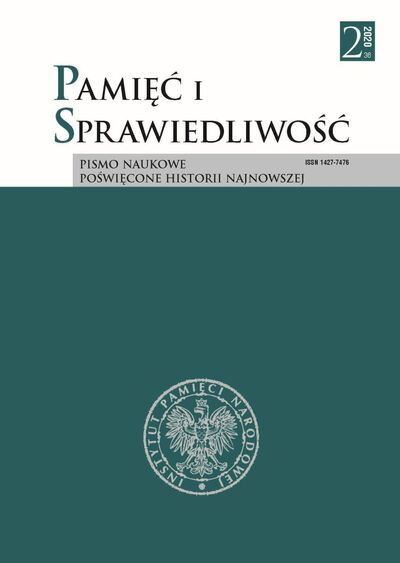Between Pyongyang and Seoul – a Rocky Road to Establishing Diplomatic Relations between Poland and the Republic of Korea
Pamięć i Sprawiedliwość, Vol. 36 No 2 (2020), pages: 483-508
Publication date: 2020-12-31
 https://doi.org/10.48261/PIS203625
https://doi.org/10.48261/PIS203625
Résumé
The paper presents South Korean efforts to establish economic and political relations with Communist Poland which resulted in establishment of diplomatic relations on 1 November, 1989. In the 1970s the Republic of Korea (ROK) decided to initiate contacts with selected Communist states in order to find new export markets and to get wider international recognition. It was a part of competition with Democratic People’s Republic of Korea (DPRK) for legitimacy. For many years Communist Poland ignored South Korean initiatives and continued to maintain diplomatic relations with North Korea. Polish approach to South Korea has changed in the 1980s when Communist Poland faced a serious economic crisis and the ROK’s economy grew rapidly. The remarkable economic development of South Korea convinced the USSR and its satellites to perceive the ROK as a potential source of credits and investments. Taking into account internal problems and new Soviet policy towards South Korea, the authorities of Communist Poland decided to start trade with the ROK. However, South Korea’s representatives declared that the ROK would give credits and invest in Poland only after establishing full diplomatic relations. Prime Minister Mieczysław Rakowski gave a green light to do so, but the final step was made when the government was led by Tadeusz Mazowiecki. Thus, Poland became the second state from the collapsing Eastern Bloc to establish diplomatic relations with the ROK.
Références
Archiwum Akt Nowych
Archiwum Instytutu Pamięci Narodowej
Archiwum Ministerstwa Spraw Zagranicznych
Sejm Expose of the Minister of Foreign Affairs of the Republic of Poland, Krzysztof Skubiszewski, Warsaw, 26 IV 1990.
The Korean War Armistice Agreement, Annex, Terms of Reference for Neutral Nations Repatriation Commission, Panmunjom, 27 VII 1953.
Unitrex Company, United States Department of Justice, Federal Bureau of Investigation, Chicago, 15 V 1975.
Ahn Sung Mi, “S. Korea provided $125m in loans to Hungary in 1989 for diplomatic relations”, The Korea Herald 31 III 2020.
Benken P., “Uwagi na temat najnowszych prac dotyczących aktywności Misji Polskiej w Komisji Nadzorczej Państw Neutralnych w Korei w latach 1953–1989 oraz możliwości ich uzupełnienia na podstawie nowych źródeł”, Studia z Dziejów Polskiej Historiografii Wojskowej 2013, vol. 14.
Blum H., “A Key Polish Banker Defects; Linked To Spying For Warsaw”, The New York Times 22 X 1982.
Cha Jung Mia, “Analysis of the Implementation of South Korea’s Nordpolitik in 1970s–1990s. Focusing on the Interaction between Environment and Foreign Policy Decision-Making”, Korea Observer 2020, vol. 51, no. 1.
Dudek A., Historia Polityczna Polski 1989–2005 (Cracow, 2007).
Grala D.T., Reformy ekonomiczne w Polsce (1982–1989) (Warsaw, 2005).
Hańderek M., “Hard Times – Poland and North Korea in the first half of the 1960s” [in:] Korean Peninsula – Traditions, Culture, Historical Perspectives, ed. Kim So Young (Sofia, 2019).
Hańderek M., “Poland and North Korea in the 1980’s – from Partnership to Stagnancy” [in:] Korean Society Today, ed. A. Fedotoff, So Young Kim (Sofia, 2019).
Hańderek M., “PRL na straży pokoju w Korei”, Biuletyn Instytutu Pamięci Narodowej 2018, no. 10.
Jonnson G., Peace-keeping in the Korean Peninsula: The Role of Commissions (Seoul, 2009).
Kaliński J., “Rubel transferowy” [in:] Systemy walutowe współczesnego świata, ed. J. Łazor, W. Morawski (Warsaw, 2018).
Kim Bogook, “The Diplomatic Relationship between Hungary and South Korea: 1948–1982” [in:] Korea and Eastern Europe. Exploring the Past, ed. A. Fedotoff, Kim So Young (Sofia, 2017).
Majkowski A., “Geneza nawiązania stosunków dyplomatycznych między Polską a Republiką Korei”, Azja-Pacyfik 2000, no. 3.
Radchenko S., Sport and Politics on the Korean Peninsula: North Korea and the 1988 Seoul Olympics, North Korea International Documentation Project, E-DOSSIER 3, XII 2011.
Radchenko R., Unwanted Visionaries. The Soviet Failure in Asia at the End of the Cold War (New York, 2014).
Role of the NNSC in shaping the security architecture at the Korean Peninsula after signing of the Armistice Agreement (Seoul: Embassy of the Republic of Poland, 2013).
Schaefer B., “Overconfidence Shattered: North Korean Unification Policy, 1971–1975”, North Korea International Documentation Project, Working Paper 2, XII 2010.
Szyc S., “The Relations between Poland and North Korea between 1948 and 1961”, Progress. Journal of Young Researchers 2017, vol. 2.
Who’s Who in Polish America, ed. B. Wierzbiański (New York, 1996).
Licence
(c) Tous droits réservés Pamięć i Sprawiedliwość 2023

Ce travail est disponible sous licence Creative Commons Attribution - Pas d'Utilisation Commerciale - Pas de Modification 4.0 International.
https://creativecommons.org/licenses/by-nc-nd/4.0
Articles les plus lus par le même auteur ou la même autrice
- Marek Hańderek, Wojciech Jaruzelski, Kim Il Sung i zbliżenie na linii PRL–KRLD w latach osiemdziesiątych XX wieku , Pamięć i Sprawiedliwość: Vol. 41 No 1 (2023)
- Tomasz Sikorski, Marek Hańderek, Tomasz Sikorski, Polski Savonarola. Pisma polityczne Kazimierza Studentowicza z lat wojny i okupacji, Dom Wydawniczy Duet, Toruń 2013, 678 s. , Pamięć i Sprawiedliwość: Vol. 26 No 2 (2015)
 Język Polski
Język Polski
 English
English
 Deutsch
Deutsch
 Français (France)
Français (France)
 Italiano
Italiano
 Русский
Русский



 PDF (English)
PDF (English)




